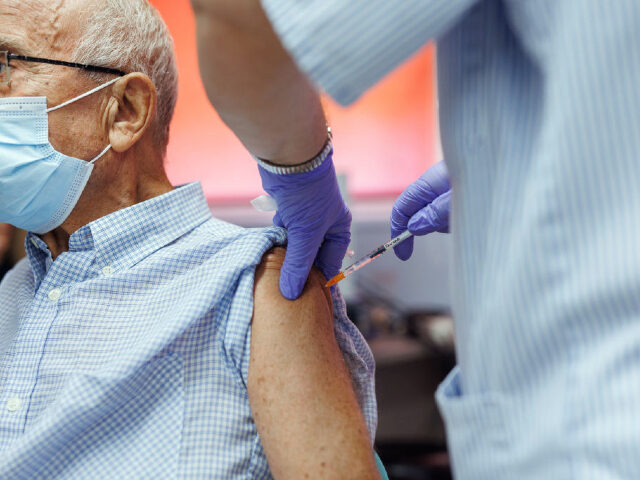Florida Surgeon General Joseph Ladapo last week highlighted some of the risks associated with Coronavirus mRNA vaccines, pointing to another study “consistent with Florida’s analysis,” showing a link between the shot and myocarditis.
Ladapo linked to research titled, “Autopsy-based histopathological characterization of myocarditis after anti-SARS-CoV-2-vaccination,” which revealed autopsies showing that five out of 35 individuals who died suddenly within 20 days of receiving a coronavirus vaccine had myocarditis “as a likely/possible cause of death.”
“Thanks, @TracyBethHoeg, for highlighting these results that are consistent with Florida’s analysis. Autopsies found that 5/35 people who died suddenly within 20 days of COVID-19 vaccination had myocarditis as a likely/possible cause of death,” Ladapo wrote:
According to the study, “data on autopsies of persons, who received anti-SARS-CoV-2 vaccination (up to 20 days before their death), were obtained from the COVID autopsy and biomaterial registry Baden-Württemberg.” All of the autopsies in this particular study were performed at the Heidelberg University Hospital “to ensure that all medical documents and findings were available and that the autopsies were performed according to the standardized procedure described previously.”
The report states that the hearts of the deceased were “examined macroscopically by measuring the weight and the thickness of the left, right and interventricular walls,” further explaining the methods:
Coronary arteries were dissected from their aortic branching to the periphery to allow for evaluation of arteriosclerosis and exclusion of thrombi. Afterwards, the inflow and outflow tracts were examined, the ventricles were cross-sectioned in short axis (transversal plane) at 1 cm intervals from the valves to the apex and the cut surfaces were examined for focal lesions (or geographic demarcations), a focussed dissection and detailed histological evaluation of the cardiac conduction system was not performed.
…
In most cases, an inflammatory infiltration of the epicardium and the subepicardial fat tissue was concomitantly found (cases 2, 3, 4 and 5; Supplementary Fig. 4) and revealed an identical immunophenotype. (T-cell dominant; CD4 > > CD8). In case 2, a prominent CD4-positive lymphocytic infiltration was also recorded at the jab site of the deltoidal muscle (Fig. 3).
Ultimately, the study examined 35 individuals, ten of whom were determined to have other causes of death. However, the study found that “cardiac autopsy findings consistent with (epi-)myocarditis were found in five cases of the remaining 25 bodies found unexpectedly dead at home within 20 days following SARS-CoV-2 vaccination.”
Four of the individuals, per the report, died after the first vaccine jab, and the other individual died after the second dose.
“All persons died within the first week following vaccination (mean 2.5 days, median 2 days). Clinical findings, blood tests, ECGs or imaging data were not available as deceased persons did not seek medical attention prior to death,” it found, further detailing the findings:
Person 1 was found dead 12 h after the vaccination. A witness described a rattling breath shortly before discovering circulatory failure. Person 2 complained about nausea and was found dead soon thereafter. Resuscitation was started immediately but without success, respectively. The other persons were found dead at home without available information about terminal symptoms. According to the available information provided at the time of autopsies, none of the deceased persons had SARS-CoV-2 infection prior to vaccination and nasopharyngeal swabs were negative in all cases.
Notably, this study did not appear to focus on the age range that saw the greatest increase in myocarditis, and it also noted it was “limited by the relatively small cohort size and inherits the bias of an endpoint analysis.”
“The nature of our autopsy study necessitates that the data are descriptive in quality and does not allow any epidemiological conclusions in terms of incidence or risk estimation,” it states, adding, “The reported incidence of (epi-)myocarditis after vaccination is low and the risks of hospitalization and death associated with COVID-19 are stated to be greater than the recorded risk associated with COVID-19 vaccination.”
In October, Florida updated its vaccine guidance, advising against the mRNA jab for men under the age of 40. The move was prompted by a Department of Health analysis, revealing an 84 percent increase in “the relative incidence of cardiac-related death among males 18-39 years old within 28 days following mRNA vaccination.” The guidance also stated that males over the age of 60 had a ten percent “increased risk of cardiac-related death within 28 days of mRNA vaccination.” It found that non-mRNA vaccines did not pose the same risk.
Initially, Twitter censored Ladapo’s guidance, asserting it violated its policies on coronavirus “misinformation.” However, the social media giant later restored it. Ladapo took to Twitter with a dose of positivity, highlighting the discussion that was stimulated as a result of the post and subsequent censorship.
“Isn’t it great when we discuss science transparently instead of trying to cancel one another?” he asked at the time.
Ladapo noted on Friday, after sharing the data, that “these deaths aren’t captured by other studies because these patients never made it to the hospital.”
“mRNA COVID-19 vaccines are far less safe than any vaccines widely used. When does sanity return to science? Why do scientists breathlessly defend this technology?” the official asked:
In June 2021, the U.S. Centers for Disease Control and Prevention (CDC) affirmed that some vaccinated individuals were developing what they described as a “rare heart inflammation” condition after receiving one of the mRNA shots.
It remains unclear if the vaccines are providing substantial immunity against the latest variants, but public health officials are continuing to urge eligible individuals over the age of five to get a booster shot.
Nonetheless, it is now well-known that, despite initial misinformation spread by President Biden last year, the vaccines do not prevent one from contracting nor spreading the virus.

COMMENTS
Please let us know if you're having issues with commenting.